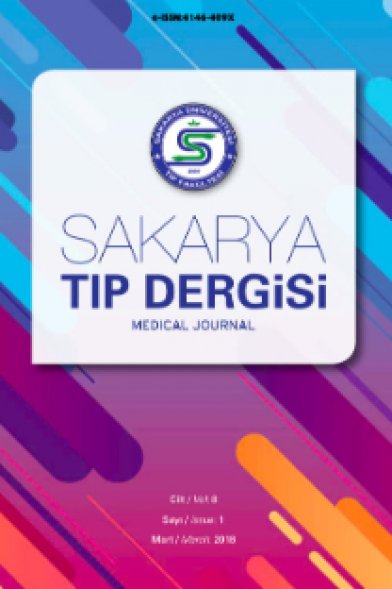Covid-19 Hastalığında Nsaid’lerin Kullanımı
Dear Editor,
Recent studies suggest non-severe and severe stages of SARS-CoV-2 infection. During the incubation and non-severe stage of the virus, the immune system eliminates the virus and prevent its progression which non-steroidal anti-inflammatory drugs (NSAIDs) may also interfere with immune system [1]. The severe stage includes lung inflammation where it is associated with acute immune response and cytokine storm, which may raise questions regarding the use of NSAIDs [2].
According to the reports of The French Regional Pharmacovigilance Centers (CRPVs) based on according to clinical, experimental, pharmacological, and epidemiological data in 2019, NSAIDs (especially ibuprofen) aggravates bacterial infection (in particular pulmonary infection). CRPV suggest use of the NSAIDs should be avoided in the symptomatic treatment of complications such as fever, pain, and myalgia that in case of infection [3].
In hospitals of Dutch University, thrombotic complications were observed in 31% of 184 SARS-COV-2 infected patients hospitalized in intensive care unit, and pulmonary embolism made up of 81% of these complications [4]. Arian et al. stated that there is no definitive link between ibuprofen and pulmonary embolism, and the existing data are conflicted. They argued that it is not known how ibuprofen interacts with SARS-CoV-2 mechanism, nonetheless high doses of ibuprofen should be avoided in patients with suspected thromboembolic events [5]. Furthermore, Committee on Human Medicines in UK reports there is no sufficient data on the use of ibuprofen and its association with COVID-19, or worsening symptoms [6]. According to a study investigating the effect of ibuprofen on cardiac fibrosis in diabetic rats, ibuprofen increased expression of angiotensin-converting enzyme 2 (ACE2) [7]. This is important since ACE2 receptor is a gateway for SARS-COV-2 to enter into the human body [8].
In conclusion, concerns have arisen that NSAIDs interact with COVID-19 infection or aggravates symptoms. There are no extensive and comprehensive clinical studies showing pros and cons of NSAID use in COVID-19 positive patients. It is important for COVID-19 patients to avoid high doses and be aware of side effects of ibuprofen.
NSAIDs’ Use In Covid-19 Disease
Dear Editor,
Recent studies suggest non-severe and severe stages of SARS-CoV-2 infection. During the incubation and non-severe stage of the virus, the immune system eliminates the virus and prevent its progression which non-steroidal anti-inflammatory drugs (NSAIDs) may also interfere with immune system [1]. The severe stage includes lung inflammation where it is associated with acute immune response and cytokine storm, which may raise questions regarding the use of NSAIDs [2].
According to the reports of The French Regional Pharmacovigilance Centers (CRPVs) based on according to clinical, experimental, pharmacological, and epidemiological data in 2019, NSAIDs (especially ibuprofen) aggravates bacterial infection (in particular pulmonary infection). CRPV suggest use of the NSAIDs should be avoided in the symptomatic treatment of complications such as fever, pain, and myalgia that in case of infection [3].
In hospitals of Dutch University, thrombotic complications were observed in 31% of 184 SARS-COV-2 infected patients hospitalized in intensive care unit, and pulmonary embolism made up of 81% of these complications [4]. Arian et al. stated that there is no definitive link between ibuprofen and pulmonary embolism, and the existing data are conflicted. They argued that it is not known how ibuprofen interacts with SARS-CoV-2 mechanism, nonetheless high doses of ibuprofen should be avoided in patients with suspected thromboembolic events [5]. Furthermore, Committee on Human Medicines in UK reports there is no sufficient data on the use of ibuprofen and its association with COVID-19, or worsening symptoms [6]. According to a study investigating the effect of ibuprofen on cardiac fibrosis in diabetic rats, ibuprofen increased expression of angiotensin-converting enzyme 2 (ACE2) [7]. This is important since ACE2 receptor is a gateway for SARS-COV-2 to enter into the human body [8].
In conclusion, concerns have arisen that NSAIDs interact with COVID-19 infection or aggravates symptoms. There are no extensive and comprehensive clinical studies showing pros and cons of NSAID use in COVID-19 positive patients. It is important for COVID-19 patients to avoid high doses and be aware of side effects of ibuprofen.
___
- [1]. SFPT. ACE2, IEC/ARAII et infections à COVID-19. 2020. https://www.em-consulte.com/em/covid-19/IEC-ARA2-et-COVID19-22-mars-2020.pdf. [Accessed May 29, 2020 (14 pp.)].
- [2]. Mehta P, McAuley DF, Brown M, Sanchez E, Tattersall RS, Manson JJ. COVID-19: consider cytokine storm syndromes and immunosuppression. Lancet 2020;395(10229):1033–4.
- [3]. Soeiro T, Bourneau-Martin D, Micallef J, Jonville-Béra AP. Multisource comprehensive review on whether ibuprofen exacerbates bacterial infections. Br J Clin Pharmacol 2020 Apr 13:30. Abstract OC045. https://bpspubs.onlinelibrary.wiley.com/doi/epdf/10.1111/bcp.14266. [Accessed May 29, 2020 (49 pp.)]
- [4]. Klok FA, Kruip MJHA, van der Meer NJM, et al. Incidence of thrombotic complications in critically ill ICU patients with COVID-19. Thrombosis Research, 2020. 191: p. 145-147.
- [5]. Arjomandi Rad A, Vardanyan R, Tas NR. Ibuprofen and thromboembolism in SARS‐COV2. J Thromb Haemost. 2020. Accepted Author Manuscript. doi:10.1111/jth.14901
- [6]. Gov.UK. Commission on human medicines advice on ibuprofen and coronavirus (COVID-19). gov.UK. 2020. https://www.gov.uk/government/news/commission-on-human-medicines-advice-on-ibuprofen-and-coronavirus-covid-19. Accessed 29 May 2020.
- [7]. Qiao W, Wang C, Chen B, et al. Ibuprofen attenuates cardiac fibrosis in streptozotocin-induced diabetic rats. Cardiology 2015;131(2):97–106.
- [8]. Zhang H, Penninger JM, Li Y, Zhong N, Slutsky AS. Angiotensin-converting enzyme 2 (ACE2) as a SARSCoV-2 receptor: molecular mechanisms and potential therapeutic target. Intensive Care Med 2020;46(4):586–90.
